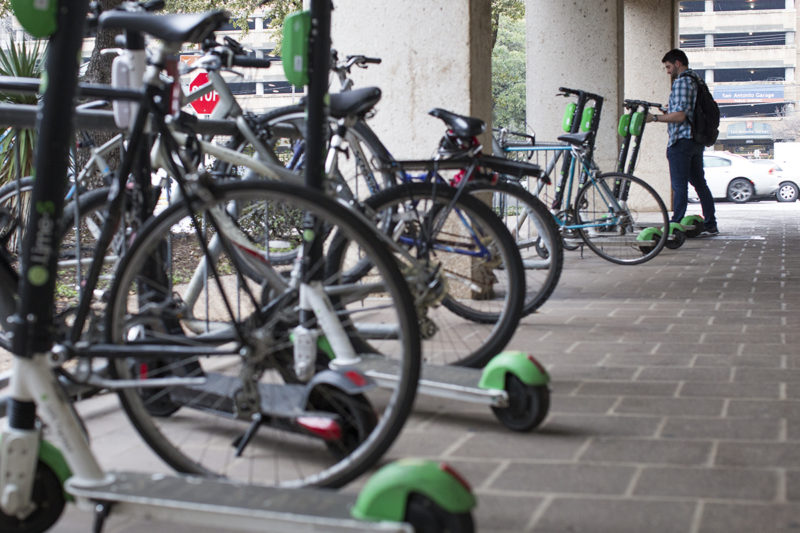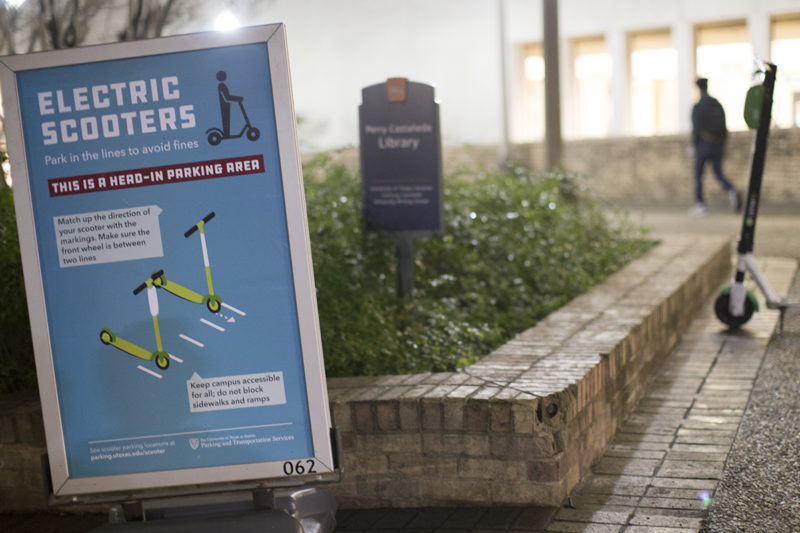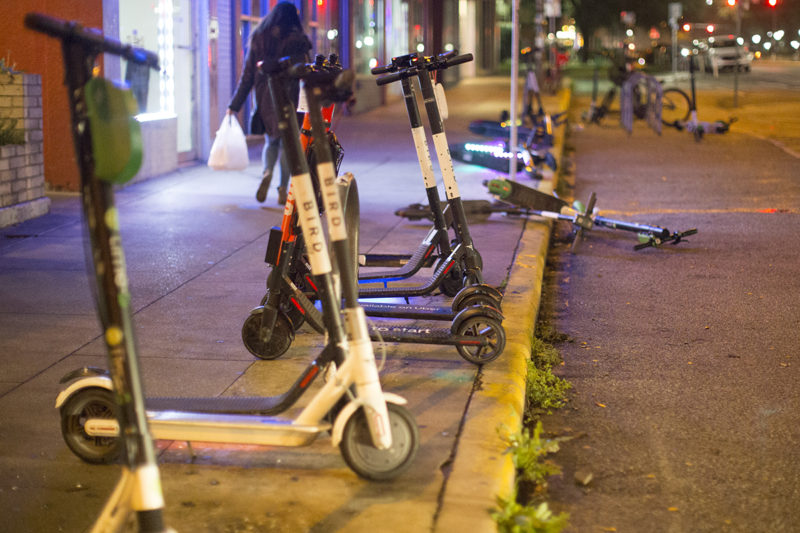UT Takes on the Scooters
By Reid Jowers
Reporting Texas

University of Texas at Austin student Daniel Voinis takes one of the parked scooters on campus on Monday, Feb. 11, 2019. Cristina Pop/Reporting Texas
To their fans, electric scooters offer an affordable, eco-friendly way to make that lengthy cross-campus trek between classes a breeze.
Critics complain the vehicles clutter sidewalks and building entrances, not to mention the risks they pose from a rising number of scooter-related accidents.
Against this backdrop, the University of Texas at Austin has taken on the scooters, announcing a two-pronged policy aimed at regulating scooter use and etiquette.
Under phase one, now in effect, the university has designated 10 parking zones around campus and will impound scooters parked elsewhere, specifically in places that obstruct access to public spaces.

An electric scooter parking sign is seen near the Perry Castañeda Library on the University of Texas at Austin campus. Cristina Pop/Reporting Texas
Later this spring, UT is considering an 8-mph speed limit on scooter traffic and empowering Parking and Transportation Services and the UT Police Department to adopt additional ticketing procedures.
University officials say they may also prohibit faculty and staff from work-related use of scooters.
The crackdown comes in the wake of 110 scooter-related accidents between August and December 2018, according to University Health Services.
Melissa Loe, director of communications for UT’s Financial and Administrative Services, says the new policies are working. “Awareness and education efforts about the parking rules have resulted in a noticeable behavior change since the Jan. 22 announcement,” she said.
“Scooter users are actively trying to comply. Scooters are being parked at campus bike racks and in the newly marked zones,” Loe said.
According to Loes’s office, UT parking authorities relocated more than 1,000 improperly parked scooters between Jan. 22 and Feb. 15 and impounded more than 600.

Electric scooters scattered in front of The Callaway House Austin in West Campus on Saturday, Feb. 9, 2019. Incorrect parking of these scooters can incur a fine up to $150. Cristina Pop/Reporting Texas
Colton Becker, UT student government president, worries that UT’s policy of charging $150 per impound may be passed along to budget-strapped student riders. And since scooters are light and mobile, Becker says, someone could move a properly parked scooter to a no-parking zone, effectively sabotaging the last rider.
“I hope they roll out the fines slowly,” Becker said.
Charlotte Canning, chair of the Faculty Senate, says faculty have concerns about proposals to prohibit them from work-related use of scooters or require them to wear helmets. “Why would faculty have to wear helmets but not the other constituencies?” Canning said.
In December, student government passed resolutions calling on the administration to continue scooter safety education and designate Speedway as a no-parking zone.
“These policies were definitely needed,” Becker said. “People just throw them in the middle of the road, and if you’re handicapped, what are you supposed to do, jump the curb?”
Canning said the Faculty Council has no position on scooters nor any role in regulating them but that “many members have expressed concerns about safety. There have been no objections over the current regulations.”

Electric scooters line the street near the University of Texas at Austin campus. Cristina Pop/Reporting Texas
Of the 110 injuries treated by University Health services from August to December last year, more than 40 percent occurred off campus. On Feb. 1 this year, UT student Mark Sands died from injuries sustained in a collision with a car while he was riding a scooter the wrong way down an Interstate 35 frontage road. Sands was the first scooter-related fatality in Austin.
The City of Austin announced has plans to put its own policies into effect later this spring, including requiring scooters to obey traffic signals and yield to pedestrians and bicyclists. Currently, the city is gathering data to develop location-specific traffic ordinances and safe riding zones.
According to UT’s recent Dockless Scooters Report, the university’s scooter working group will continue to review new data and monitor changes in city policy in coming months and add recommendations as needed.